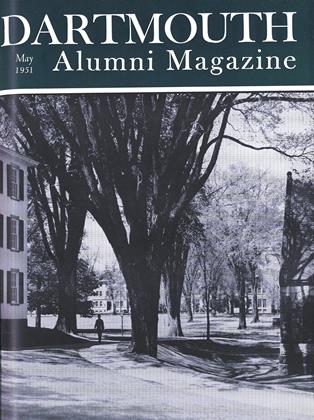President Truman's executive order of March 31, permitting the postponement of military service for certain qualified college students, gave the educational world and the general public a topic for heated debate last month. In the midst of it all, Dartmouth officials went ahead with preparations for what seems to have a clear claim to being the biggest examination in the College's history. On May 26 as many as 2,000 students in Hanover may be taking the special qualifying test that is being prepared and administered for Selective Service by the Educational Testing Service, which handles the annual College
Boards. Dartmouth has been designated as one of the thousand testing centers throughout the country, and since May 26 is the only one of three test days that falls within the regular college year, it is expected that all Dartmouth students who apply for the optional test will be allowed to take it on that day. This involves some complex academic logistics for the College, especially for Prof. C. N. Allen '24 of the Psychology Department, who has been named director of the Dartmouth testing center. Most members of the faculty will probably be involved in proctoring the mass examination which will have to spread out in classrooms and other places all over the campus.
Under the college draft deferment plan, students who attain a specified score on the qualification test or who stand high enough in their college classes may, at the discretion of their local draft boards, be deferred from military service and allowed to continue in college. The three-hour qualifying test, it has been announced, will not deal with factual knowledge but will be a test of ability to learn at the college level. Just what percentage of students will pass such a test will vary from college to college, but for an institution like Dartmouth, with high standards in both admission and educational program, the proportion of students qualifying by means of the test should be relatively high. Scholastic qualification, by means of the test or class standing, does not mean automatic deferment, however; it is simply the basis on which students may apply to their local draft boards for temporary postponement of service.
In the educational world, the roundest denunciation of the plan as undemocratic came from President Conant of Harvard and President Dodds of Princeton. Others gave the plan full backing and most took a middle ground. President Dickey, while agreeing with the principle of maintaining a steady flow of college-trained men, expressed the fear that the new deferment plan might increase the "anti-intellectual" feeling already in existence and might cause public misunderstanding of the position of the colleges and their students. In the April 10 issue of The New York Times, he was quoted as follows:
"Such misunderstanding will breed irresponsible and dangerous attacks on the whole system of higher education. I agree emphatically with the objective of main- taining a flow of trained men through our colleges and universities at all times. But many of us believe that there are better ways to reach that objective. Specifically, I think that prompt action on pending man- power legislation along the lines of the bill passed by the Senate would go far toward meeting the serious needs of the nation while avoiding the worst possibilities of a sour public attitude on deferment of those who must be kept at work on higher education studies."
Announcement of the Selective Service deferment plan for college students, Congressional action in setting the lowest draft age at 1814, and the prospect that practically all high school graduates will be permitted to start their college careers this fall stimulated the Dartmouth campus to conjectures about the College's 1951 summer term and to the inevitable unfounded rumors that the College had decided to cancel it because it was no longer urgently needed. This prompted the Committee on Emergency Adjustments to announce that the summer term will be offered as announced "unless the number of students desiring to attend proves to be so small that a satisfactory offering of courses cannot be provided."
The College expected to have its first definite idea of summer term enrollment around the first of May. Men now in college had until then to register for the term, and entering freshmen, the majority of whom received their notices of admission during the week of April 16, had until the same date to make their definite acceptances and to notify the College whether they wished to matriculate in July or September.
 View Full Issue
View Full Issue
More From This Issue
-
 Article
ArticleDeaths
May 1951 -
 Article
ArticleBlueprinor Survival
May 1951 By WILLIAM STUART MESSER -
 Article
ArticleHe Values the Rare In Books and Life
May 1951 By JOHN HURD '21 -
 Class Notes
Class Notes1918
May 1951 By ERNEST H. EARLEY, DONALD L. BARR, RICHARD A. HOLTON -
 Article
Article1949
May 1951 By ROBERT H. ZEISER, DAVID S. VOGELS JR., JOHN F. STOCKWELL -
 Class Notes
Class Notes1905
May 1951 By GEORGE W. PUTNAM, GILBERT H. FALL, FLETCHER A. HATCH
C.E.W.
-
 Article
ArticleDartmouth Night
November 1949 By C.E.W. -
 Article
ArticleThe Job Outlook
May 1951 By C.E.W. -
 Article
ArticleFINANCES
DECEMBER 1962 By C.E.W. -
 Article
ArticleALUMNI TALLY
DECEMBER 1962 By C.E.W. -
 Feature
FeatureThe Wallace Affair
JUNE 1967 By C.E.W. -
 Feature
FeatureTwelve Hours and Their Aftermath: The Student Seizure of Parkhurst Hall
JUNE 1969 By C.E.W.
Article
-
 Article
ArticleSPEECH OF FRANK S. STREETER, ESQUIRE, PRESIDING AT THE ALUMNI DINNER, WEDNESDAY, JUNE 26
AUGUST, 1907 -
 Article
ArticleENLARGED WAR WORK FOR PRESIDENT HOPKINS
July 1918 -
 Article
ArticleGlossary
JUNE 1965 -
 Article
ArticleCOREY FORD'S GYM
June 1955 By DAVID RAFAEL WANG '55 -
 Article
ArticleCommencement
June 1981 By James L. Farley '42 -
 Article
ArticleETTA M. NEWELL ASST. LIBRARIAN EMERITUS
May 1940 By Nathaniel L. Goodrich


